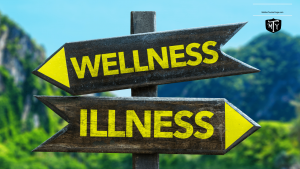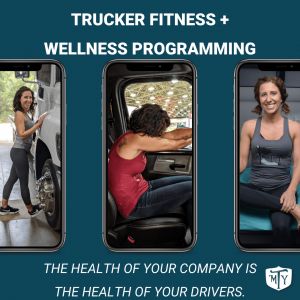World Suicide Prevention Day: 6 Strategies to Improve Driver Mental Wellness
Everyone talks about mental health, and unfortunately, the term “mental health” has a more negative connotation than positive. After talking with dozens of people from various backgrounds, most felt the time “mental health” felt there was something wrong with you, and therefore, you need to take care of your mental health.
How did we get to this place? This place where we are looking for solutions, answers, and strategies for aspects of our health only when we are in a state of turmoil, anguish, or pain?
I used to feel embarrassed to tell others that I had “mental health” like a disease. And if I dare mention I need mental health help, I would be mortified of the other person’s response.
A few years back, I began to change my conversation around mental health. And since the term “mental health” has the stigma of being broken and therefore needing help. I decided to change the term of mental care to mental wellness.
Mental Wellness is the state in which one makes the state of the mind, thoughts, emotions, and behaviors a priority. Whereas the actions were taken are both proactive and reactive, but really, as a means of a simple lifestyle integration.
Today is Suicide Prevention Day. It’s kind of a bit strange to have a day focused on this when right next to it is National Hot Dog Day, Love Your Dog Day, and Grandparents Day. But I suppose a day is better than nothing.
As someone who has stood face to face with suicide more than once, to me, suicide is a feeling of last resort, that all hope is lost, and any other actions taken will not be successful. I believe people are driven to suicide by many factors, and the why is not for argument’s sake, but from my own experience, I reflect on the what and the how. How did I get to that place, and what could have helped or been different?
To anyone out there that is struggling with their mental wellness, I want you to know that you are not alone.
I also want you to know that I see you and hear you. The words you don’t speak. The side of yourself you do not show. I see you.
And instead of posting a suicide prevention hotline number on our blog, I thought it would be more helpful to share some of the mental wellness strategies I have used over the years. And when it comes to truck driver health issues, mental wellness should be a priority.
6 Things To Improve Mental Wellness and Aid In Suicide Prevention
#1. Believe you are worth it.
Or at least say it to yourself until you do. For years I didn’t, and I recognize that this was a learned behavior, a lie I was telling myself based on what I saw someone in my own life do over and over again. If you have breath in your body, then there is still a purpose for you.
This tiny spark inside me kept telling me don’t lose hope. It was quiet and almost impossible to hear or see among the thoughts of self-destruction, self-hate, and sadness. But it was there. Today look in the mirror and tell yourself you are worth it. Despite what the mind says back, fight that other self (I called it my addictive mind) and say it anyway. When it comes to truck driver health, as a driver, you may already feel isolated and alone and that makes it even easier to allow your mind to spiral. Speak positively about yourself every day.

#2. Healthy Expression.
It is easy for an outsider to tell someone depressed, suicidal, or lost hope to seek help. But the paralyzing effects of negative, depressive, self-destructive thoughts are paralyzing. It can take all you have to get up out of bed and get a drink of water, let alone get dressed and go to work. So rather than suggesting you journal, practice yoga, deep breathe (check out our deep breathing meditation for drivers), meditate, or call a safe friend when you are in that moment. Do it when you are feeling good. You need to cultivate habits in those impossible moments and practice them in the more accessible ones by doing the actions.
Because our thoughts become our emotions, and our actions become our outcomes, and the cycle continues. And before you know it, every day is the same.
Dr. Joe Dispenza says “that if you keep thinking in the past, you will keep creating the same life”. If you continue to allow your brain to only think about what has happened to you in your life up to this point, you will only get a repeat of what you have had in your life up to this point. That means the same thoughts, emotions, and actions on autopilot. Disrupt that cycle when you are having a good day so that you can do it on those not-so-good days too.
#3. Change the cycle of your day.
Routine is good when it is good. But routine can also be a toxic habit that leads us down the same pathway we have been down repeatedly. By changing the cycle of your behaviors and routines, you can increase the chances of changing your thoughts, emotions, and now outcomes.
Start small. Start with something small and easy like drinking a glass of water in the morning, and as you drink it, tell yourself this is healthy for me. Do that every day, and after 90 days, you will have completed 90 new behaviors and told yourself 90 times you are healthy. Do that for a year, and that’s 365 times you have engaged in healthy behaviors and 365 times you have told yourself you are healthy. It all adds up.
#4. Surround Yourself With Wellness.
I don’t mean to sit in the middle of a health food store and never leave. I mean, on those good days, make a list of people, places, and things you can do, go to see, listen to, watch, and have that make you feel good. At one point in my life, I found myself consumed with Joyce Meyer’s books. I read them all. I particularly loved the Battle Field of the Mind. I read them over and over. They gave me hope, strength and shifted my thoughts away from the unhealthy cycle and, even if just for a brief moment, into a more healthy one.
What are you currently doing on social media? If you find yourself consumed with groups and pages where people complain, are angry, and breed negativity. It might be best you delete them immediately. The same goes for people in your life. Find groups, connections, and affiliations where you feel safe and breed a positive vibe, where if needed, you can express yourself and even ask for help. And if you ever find yourself reading a post like that, reach out. Don’t just comment with praying hands emoji or saying I’m here for you. Sometimes the action of half help can make it worse. Instead, reach out directly to them. Private message them and start a conversation, or even call them. You might just save someone’s life.
What music boosts your mood? I know how tempting listening to the downward spiral number one hit songs where singers share about their pain, hurt, and destruction. But don’t go there. You are only reconfirming how you feel and not allowing yourself to get out of it. What makes you feel good? Surround yourself with it.
#5 Do It Anyways.
Some things make us feel good AFTER we do them. But getting ourselves to do them is often the problem. The key is not to think and do it. I love how I feel when I do my hair. I also love how I feel when I exercise and go for a walk every day. But the moment I give myself time to think about it, the weight of the world has now seeped in and taken over. So don’t think. And the momentum you feel and receive from the boost in endorphins afterward is the moment that will keep you coming back for more.
#6 Know when it’s time for more.
I got to the point where I felt there was no hope for me. And although I was not in a place where suicide was on the docket anymore, I felt hopeless, empty, and lost. Physically I felt like I was going to vomit thinking about what I was about to do, but the alternative of living this way any longer outweighed what I was about to do. The day I spoke these three words to someone I trusted, I felt a relief I had never felt before. “I need help.” I had no idea what that helped looked like at that moment, but my ego had finally broken its last piece, and I no longer cared about anything other than not feeling this way.
Who can you reach out to today? Who is safe? That person didn’t have all the answers that day and what came next was scary too (lots of new things), but nothing is as frightening as where I had already been. I had already experienced hell, so what could be worse?
I want you to know that there is hope, help, and your mental wellness is a priority. And suicide does not have to be your only solution. Taking care of your mind, thoughts, and emotions is essential and trumps any other tasks you have in your life. Every effort you make is worthy, impactful, and shows you still see that spark at the end of the tunnel. You are worth it. Your mental wellness matters!



















